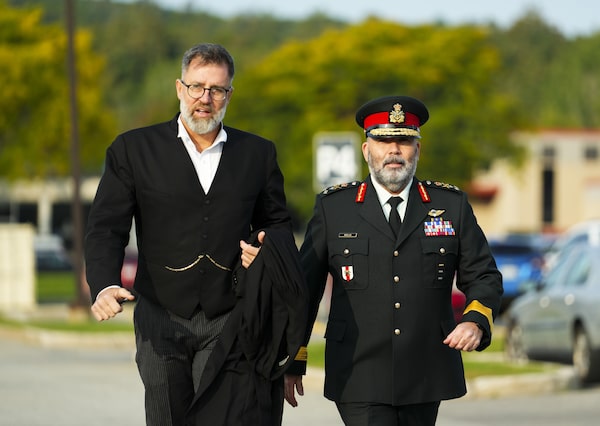
Lt. Gen Steven Whelan, right, and his lawyer, Phillip Millar arrive to court in Gatineau, Que., on Sept. 25.Sean Kilpatrick/The Canadian Press
Lieutenant-General Steven Whelan’s court martial was set back a day after his lawyer opposed the attempt by military prosecutors to admit a raft of e-mails, arguing they were irrelevant to the case and “highly prejudicial and embarrassing” to the senior commander.
Lt.-Gen. Whelan is alleged to have made improper considerations in the scoring of the performance evaluation of a subordinate in June, 2011, under threat that she would disclose their relationship to headquarters.
The court began on Tuesday expecting to hear from the subordinate, who is the complainant in the case. Instead, she waited in a side room while the court spent six and a half hours trying to figure out the process to determine whether e-mails between the accused and complainant could be admitted as evidence.
“I’m annoyed,” Commander Martin Pelletier, the military judge, told the defence and prosecution late Tuesday.
Lt.-Gen. Whelan is one of the most senior military officers to ever face a court martial in Canada. On Monday, he pleaded not guilty to a single charge of “conduct to the prejudice of good order and discipline” under the National Defence Act.
It’s “an allegation of improper consideration, which is essentially a cover-up,” military prosecutor Major Max Reede told the court Tuesday.
Defence lawyer Phillip Millar said Monday that his client was in a personal – but not physical – relationship with the complainant. However, Mr. Millar said Lt.-Gen. Whelan cut off the relationship before the two deployed and before she was under his command. He questioned the legitimacy of the case and said his client was the victim of politics.
Major Reede told the court on Tuesday that he had 10 packages of e-mails that he wanted to put to the complainant in his examination of her. He said they show both how “deeply involved” the accused was in getting the complainant deployed on his operation and “personal and inappropriate exchanges.”
The folder of papers he held was approximately two inches thick.
“Introducing these e-mails that are before the tour are highly prejudicial and embarrassing for the general,” Mr. Millar told the court. “I don’t believe that the probative value would outweigh the prejudice.”
He said the e-mails were irrelevant to the charge before the court and that it appeared the prosecution was trying to admit evidence from a second charge against Lt.-Gen. Whelan that the military dropped at the start of trial on Monday.
Top general asked senior officer to make subordinate presenting allegations about him ‘go away’
“It’s exhaling and inhaling at the same time,” Mr. Millar said.
That second charge was based on the allegation that Lt.-Gen. Whelan, who was a colonel at the time, improperly communicated with the same subordinate or made advances toward her.
Cmdr. Pelletier said the concern expressed by the defence is valid.
“It could be seen as resuscitating the charge,” the judge said, because it is connected to “an alleged crime that the prosecution, by withdrawing the charges, conceded should no longer be the subject of debate before the court.”
The judge said he’s concerned about the defence’s fear of the new e-mails being made public, which is making it difficult for the parties to agree on issues.
The complainant is scheduled to testify Wednesday. Cmdr. Pelletier said he will rule on the admissibility of the new e-mails on a case-by-case basis, depending on what the prosecution raises with the witness and whether the defence objects.
He said any of those sidebar discussions could be subject to a publication ban that would lift at the end of trial. However, he also didn’t rule out excluding the public from the complainant’s testimony entirely, an option he called “abhorrent.”
Mr. Millar suggested that other e-mails presented as evidence on Monday should suffice because they already show that Lt.-Gen. Whelan believed the exchange with his subordinate would be damaging to him.
In that 2011 e-mail exchange with a senior officer, who was his subordinate, Lt.-Gen. Whelan said “this will destroy my career and marriage.”
In the same e-mail chain, Lt.-Gen. Whelan asked now-retired colonel Rob Ubbens to make the subordinate who had accused Lt.-Gen. Whelan of inappropriate behaviour to “go away” and make it his “mission to appease” her.
 Marieke Walsh
Marieke Walsh